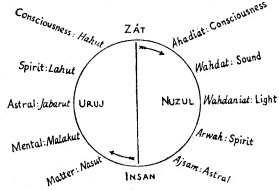The only Being has manifested Himself through seven different planes of existence, to accomplish His desire of being recognized:
1. Zát — the unmanifested
2. Ahadiat — plane of Eternal Consciousness
- Wahdat — plane of consciousness
- Wahdaniat — plane of abstract ideas
5. Arwah — the spiritual plane
6. Ajsam — the astral plane
7. Insan — the physical plane
There are, again, seven aspects of manifestation:
2. Mahtab — lunar
3. Aftab — solar
4. Madeniat — mineral kingdom
5. Nabitat — vegetable kingdom
6. Haywanat — animal kingdom
7. Insan — human kingdom
Insan, being the ideal manifestation, recognizes God by the knowledge of his own self. Man reaches this perfection by development through five grades of evolution:
2. Malakut — mental plane
3. Jabarut — astral plane
4. Lahut — spiritual plane
5. Hahut — plane of consciousness
Each grade of development prepares a person for a higher one, and perfects him in five different grades of humanity:
2. Insan — the wise man
3. Wali — the holy man
4. Qutb — the saint
5. Nabi — the prophet
The five natures corresponding to these five grades are:
2. Lauwama — one who repents of his follies;
3. Mutmaina — one who considers before taking action;
4. Alima — one who thinks, speaks and acts aright;
5. Salima — one who sacrifices himself for the benefit of others.
The following is a diagram illustrating the planes of Nuzul and Uruj (evolution and involution):

All planes of existence consist of vibrations, from the finest to the grossest kind; the vibrations of each plane have come from a higher one, and have become grosser. Whoever knows the mystery of vibrations, he indeed knows all things. Vibrations are of five different aspects, appearing as the five elements:
2. Baad — air
3. Atesh — fire
4. Aab — water
5. Khaak — earth
In relation to these elements, mankind has five senses:
Basarat — sense of sight the eyes
Samat — sense of hearing the ears
Naghat — sense of smell the nose
Lazzat — sense of taste the tongue
Muss — sense of touch the skin
Through these senses and different organs of the mental and physical existence the Ruh, the soul, experiences life; and when the Ruh receives the highest experience of all phases of existence by the favor of the murshid, then it will have that peace and bliss, the attainment of which is the only object of manifestation.
From book of Pir Inayat Khan
I'm not sure which Inayat Khan you were quoting, but here are statements from father and son, who brought Chisti Sufism to America and Europe:
ReplyDelete“The soul in its manifestation on the earth is not at all disconnected to the higher spheres. It lives in all the spheres, although it generally is only conscious of one level. Only a veil separates us. The seer’s own soul becomes a torch in his hand. It is his own light that illuminates his path. It is just like directing a searchlight into dark corners which one could not see before.” Hazrat Inayat Khan
“...grasping the inner meaning and essence of the illuminated beings who have appeared throughout the ages. Instead of attuning to the historical Jesus, we think instead of the Cosmic Christ, or Buddha Tathagata [Enlightened] instead of Siddharta Gautama. As has been stressed by virtually all major religions, whether Hinduism, Buddhism, Judaism, or Islam, the image of the prophet or a saint can only be a stepping-stone toward our direct relationship with the Divine...in which one loses oneself in the Divine Consciousness.” Vilayat Inayat Khan
Just a note of critic, the word metamorphosis is a word that implies the change in shape and form of a thing. So, while that word might be true of things in the Nasut or physical realm of man , it is most definitely not true of Hahut or Lahut , which are realms of Divine Being who has no shape nor form. A more suitable word would be Metaphysics, for metaphysics deals with the ultimate nature or first causes of things. Just a kind suggestion.
ReplyDeleteBesides my above objection, I did really enjoy your article. I found it informative and accurate , to the best of my understanding. Have you ever had the blessing of reading any of the works of Mulla Sadr ? His works on these topics are amazing and his life's story and journey is even more amazing. His influences were Ibn 'Arabi, Ibn Sina and Al-Ghazali, however, he stands alone in his own genius . He is definitely a proof of God and one of the Awliyah , to say the least.
ReplyDelete